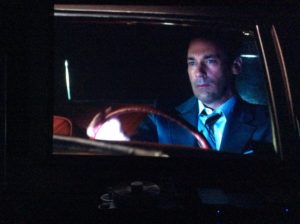„Seht! Ich zeige euch den letzten Menschen. Was ist Liebe? Was ist Schöpfung? Was ist Sehnsucht? Was ist Stern? – so fragt der letzte Mensch und blinzelt.“
(F. Nietzsche)
Abstandnahme ist eine Technik der Wahrnehmung. Nach meinem Eintritts-Debut in die Schöne Neue Fernsehwelt im vorletzten Herbst mit vier Staffeln Mad Men drehte ich der Madison Avenue den Rücken zu, um dann nach einem Jahr zurückzukehren. Wie vertraut mir die Charaktere doch geworden waren, wie angenehm und erbaulich auch dieses Werk zu schauen war. Was sich aber verändert hatte, war der inzwischen möglich gewordene Vergleich mit anderen Serien – man kommt halt viel rum. Gestern nun der Anfang der finalen Staffel von Sons of Anarchy, wiederum nach längerer Pause. Back to Charming. Ich war sofort drin, erkannte die unzweifelhafte Qualität in allen Dingen. Aber diese extremen Gewaltdarstellungen hatten mich doch unterschwellig immer sehr gestört, wie eine Gräte in vorgeblich filletiertem Fisch: es blieb einem oft im Halse stecken. Auch fehlte ja die Distanznahme mittels ironischer Überzeichnung ins Groteske und Absurde, wie beispielsweise in den Filmen Quentin Tarantinos. Nein, das ist schon Shakespeare-Kost hier: Macbeth at its best. Und wie diese Gemma im Namen ihres persönlichen Gottes, des bedingungslosen Familienzusammenhalts (eine Alternative zum Grundeinkommen), über Leichen geht, das lasse ich mir bis zum Ende nicht entgehen. Man möchte sie genüsslich durch den Fleischwolf drehen. Selbstverständlich wird dieser Staffellauf abgeschlossen, hinter der Ziellinie winkt auch schon Sneaky Pete, die Serie der Stunde. Ich sah kürzlich die erste Episode, was zur Folge hat, dass ich mich auf die nächsten neun freue. Vorfreude zählt ja bekanntlich zu den angenehmsten Prä-Emotionen in postfaktischen Zeiten. Man trifft hier Walter White wieder, jenen Drogenbastler aus Breaking Bad, der im richtigen Leben ja immer noch Bryan Cranston heisst und von Beruf Schauspieler ist. Doch Max Frisch lässt grüssen: solch eine Paraderolle wird man schwerlich los, sie haftet einem auf ewig an. Warum aber ist Sneaky Pete so gut? Weil man sofort drin ist und ab geht der fliegende Teppich. Die Handlung macht Spass, perlt leicht und augenzwinkernd dahin, ist zudem spannend, jedoch nicht allzu aufreibend. Die Schauspieler sind klasse und die Bilder erlesen. Das alles und noch viel mehr erinnert verdammt an Breaking Bad. Und sowenig wie man der Gewaltdarstellungen wegen auf die anarchischen Söhne verzichten wollte, fiele es einem im Traum ein, eine grandiose Serie einer personalen Antipathie wegen zu canceln. Wobei, Rosamunde Pilcher hatte ich ja dereinst auch verworfen, aber da handelte es sich ja um einen ganzen Clan voller Abneigungen – von den Brutalitäten verharmlosender Klischeewelten ganz zu schweigen.

